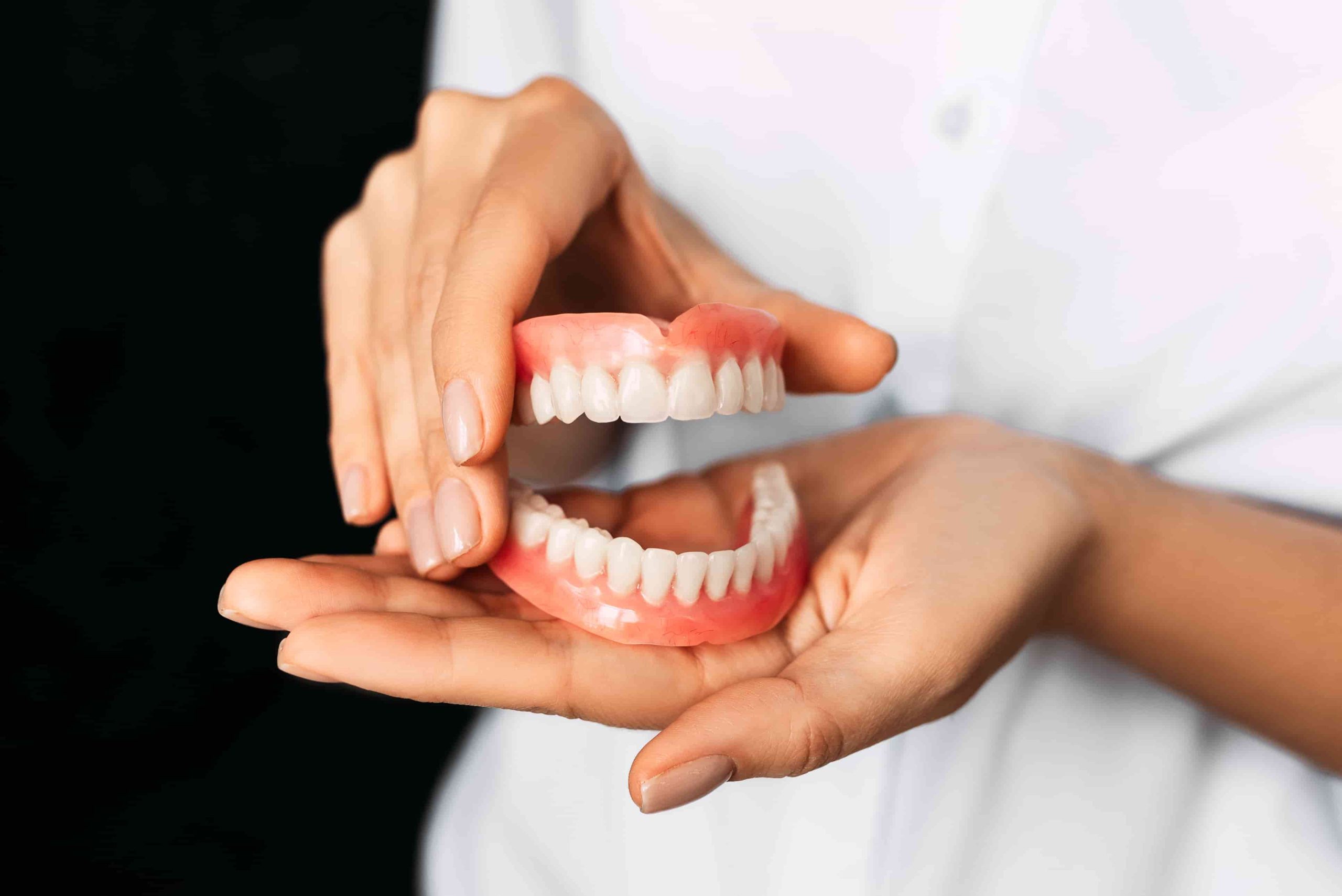
If you wear dentures, you’ll want to do everything you can to ensure they live a long and happy life. From mimicking the movement of natural teeth to giving you a glinting mouthful of pearly whites, dentures do a lot for you — so you’ll want to preserve their quality and appearance for as long as possible. In this blog post, we’ll break down some of the golden rules for your pearly whites — from denture maintenance to daily dos and don’ts. So, without further ado, let’s get into it!
Dos & Don’ts of Cleaning Dentures
Just as natural teeth require daily cleaning, so too do your dentures. That said, as much as dentures resemble naturally occurring teeth, they are not the same — so they will require a different cleaning method. Here are the dos and don’ts of cleaning dentures.
Do: Rinse Your Dentures
After eating — or drinking anything apart from water — you should remove your dentures and rinse them beneath running water. Alternatively, pool water in the sink and rinse your dentures like your dishes. While the latter method will ensure you won’t drop and break your dentures, it won’t provide the same water pressure renowned for dislodging food particles or removing residue from beverages — especially ones that stain, such as coffee. So, use your best judgement here.
The sooner you rinse your dentures after eating or drinking, the less opportunity plaque has to grow or stains have to ingrain themselves.
Don’t: Use Hot Water
Whether you’re rinsing, soaking or cleaning your dentures, one thing’s for sure: boiling or hot water will land you in — well, hot water. If your dentures come into contact with too-hot water, they risk compromising their delicate, custom-made structure. Although common sense suggests that boiling water is the deep-cleaning go-to, you’re much better off cleansing your dentures in warm water.
Do: Remove Your Dentures Before Brushing
While you can brush your dentures while wearing them, the only way to achieve a thorough clean is to remove them from your mouth. Moreover, if you’re cleaning your dentures with a denture cleanser, you should never apply this inside the mouth, as it contains a highly toxic ingredient called persulfate.
Don’t: Use Regular Toothpaste
While we’re discussing what to brush onto your dentures, regular toothpaste won’t cut it. While some non-abrasive variants may be okay, it’s best to use paste or cleanser specifically made for dentures. Because dentures are not natural teeth, chances are the formula in regular toothpaste will be too abrasive for their porcelain or acrylic resin. This problem is especially the case with teeth-whitening toothpaste, which whitens natural teeth but damages dentures due to its bleaching chemical.
Do: Use a Soft-Bristled or Denture Toothbrush
As aforementioned, dentures are usually porcelain or acrylic resin — they don’t have the toughness of enamel. For this reason, you should gently clean your dentures using either a soft-bristled toothbrush or a brush made specifically for denture surfaces.
Don’t: Neglect Old Denture Adhesive
If you use denture adhesive, it won’t seal if you try to apply it on top of the older product. Clean off all the old adhesive gel before you take your dentures out for the night.
Do: Brush Every Day & After Eating
Just because your teeth are artificial doesn’t mean they’re immune to plaque. Make sure to brush your dentures at least once daily, covering all its surfaces. For the best results, clean them after eating — or at least after consuming foods that stick or stain.
Handling Dentures With Care
Of course, a key component to preserving the quality and appearance of your dentures is to handle them with care. Made from porcelain or acrylic resin — and fashioned to fit your mouth using a delicate structure — dentures can break relatively easily. Lest you require same–day denture repair, here are some tips to avoid roughhousing your delicate dental appliance.
1. Wet Your Hands
As counterintuitive as it sounds, handling dentures with wet hands can give a secure grip and help prevent slippage. On the other hand, considering dentures almost always exist in a wet environment — be it your mouth or the glass of water by the bed — this checks out.
2. Don’t Bend or Twist
Dentures are aligned to fit inside the unique shape of your mouth. For this reason, don’t bend or twist your dentures while holding them, as this will almost certainly compromise their customised structure.
3. Leverage Towels or Basins
If you’re cleaning your dentures by hand, you may wish to do so over a towel or basin of water. Should the worst happen and you drop your dentures, a towel or pool of water may help cushion the blow.
4. Be Gentle
Perhaps the most obvious advice is to handle your dentures with all the gentleness in the world — just as you would with any fragile structure.
Storage & Overnight Care
Because dentures come out of the mouth, storing them overnight usually becomes part of the nightly dental routine. Here are some quick tips relating to storage and overnight care.
1. Soak Them Overnight
Whenever most people envision dentures, they picture them in a glass of water by the bed. You should store them overnight this way, as a nightlong soak will keep your dentures in their preferred state — wet — and prevent warping. If you’re trying to remove stains or desire a deeper clean, you can also fill the glass with a denture-cleaning solution.
2. Keep Them Away From Children & Pets
If you have little ones hanging around — be they human, furry, sharp-beaked or stealthy in any way — you need to keep your dentures out of their reach. You wouldn’t want them to break them or compromise their structure.
3. Keep Them Away From Heat Sources
Remember, hot water is a no-no if you’re handling dentures with care — so it only follows that you should keep them away from all heat sources. You wouldn’t want to risk deforming your tailor-made dentures.
4. Travel With (Denture) Care
If you’re travelling, you should ideally bring your glass, denture brush, paste or cleanser, and cleaning solution (if applicable). If this is not possible or practical, you can store your dentures in a zip-locked bag — as long as you thoroughly rinse them before re-wearing them!
Eating & Chewing Guidelines
However well dentures emulate natural tooth function, they do differ from the real thing. Accordingly, how you eat and chew with a pair of dentures will also vary from the norm. So, whether you’re new to dentures or you’ve been wearing them for a while, here are some eating and chewing guidelines to refer back to.
Do: Build Up to Solids
When you start wearing dentures, you may feel tempted to dive straight back into solid foods. That said, wearing dentures is a considerable adjustment, and you should ride out the transition by starting soft and gradually hardening up. Here’s our recommendation:
- Weeks 1–2: Adopt a diet of liquids or soft foods that don’t require chewing, such as soup, yoghurt, smoothies, mashed potatoes or applesauce.
- Weeks 3–4: Introduce soft solids, such as vegetables, pasta, meat or tofu, cut into small chunks.
- Week 4 onwards: You may now introduce slightly chewier foods.
Don’t: Eat Anything Sticky, Hard or Gummy
However you slice it, dentures function and sit in the mouth differently from natural teeth. They have a more delicate build and a much looser grip on the jaw. Accordingly, this means you should forgo foods with sticky, hard or gummy textures, such as:
- Popcorn or nuts: Those with natural teeth know the annoyance of kernels, seeds or sharp fragments catching in the teeth. In the case of dentures, imagine this — only under the appliance itself. It can cause a lot of pain and irritation.
- Multigrain bread or crackers: Similar to the above — multigrain products are renowned for little seeds that can get stuck in crannies.
- Sticky, hard or gummy lollies: A sweet moment on the lips versus the ordeal of trying to reattach your dislodged dentures.
- Steak and gristly/chewy meats: Tough textures such as these put enough pressure on dentures to dislodge them.
- Raw fruits and vegetables: See above.
- Nut butters: Do you want to scrape this off your dentures later? Because this stuff will stick.
If you find yourself craving any of the above, you can make it work by a) applying denture adhesive and b) chewing the food thoroughly before swallowing.
Do: Eat Soft Foods
The list of foods to consume week-by-week was not exhaustive. Once your dentures have found their place in your mouth, feel free to chow down on:
- Fruit that’s soft and ripe
- Vegetables — boiled, steamed or roasted
- Ground-up or slow-cooked meats
- Spreads or dips, as long as they’re smooth.
Don’t: Ramp the Heat Too High
Having established that dentures and heat are not a good mix, it should be no surprise that hot foods and drinks are also not the best idea. Like many of the sticky, hard or gummy foods listed, sustenance coming in hot can loosen your dentures — having a more significant potential for damage the longer they’re in your mouth. While we’re not banning tea or coffee, we advise you to set the kettle just below the boil — or give your drink a moment to cool. Furthermore, wearing dentures can dampen heat sensitivity in the mouth. To avoid burning your tongue or mouth, we recommend holding the hot food or drink against your lips before consuming it.
Do: Take Small Bites
When you start something new, you should usually take baby steps. Similarly, when starting with dentures, you should take nibbles or smaller bites. Not only will this feel more comfortable, but it can also help you avoid choking.
Don’t: Rush
If you’ve ever heard of mindful eating, this is more or less what we’re recommending. While savouring every bite aids mindfulness and digestion, taking it slow can also smoothen the transition into your new dentures.
Do: Use Denture Adhesive
While this is not compulsory, it’s an excellent recommendation for those concerned about loosening dentures. For peace of mind, apply denture adhesive to hold your appliance in place as you eat. It also has the bonus of preventing gum sores and irritation.
Don’t: Isolate Chewing to One Side
If you chew on a preferred side of the mouth, now is the time to even things up. When you chew on one side more than the other, you wear down your dentures on that side and risk dislodging them.
Regular Check-Ups & Maintenance
Dentures are a lifelong commitment. Once you have them, you should see your denturist yearly for regular check-ups and maintenance. What do denturists look out for at these appointments? Let’s check!
1. Changes in Mouth Shape
Your mouth changes over time. Your tissues may shrink, or your bone structure may change. When this happens, your dentures won’t move with the changes — simply because they’re not part of your mouth. Your denturist will need to adjust or reline your dentures so they’re a comfortable fit for your mouth — as it is today.
2. Oral Conditions
As is done at a regular dentist, a full or partial denture dentist will check your mouth for any oral conditions. If they notice anything amiss, they’ll administer or recommend the appropriate treatment as fast as possible.
3. Wear & Tear
Of course, denturists will check your dentures for wear and tear — which is more serious than it sounds. Chipped, cracked or worn-out dentures can alter fit or bite, leading to sores or gum inflammation. Moreover, ill-fitting dentures can compromise your ability to speak or chew, as well as your facial appearance.
4. Plaque & Staining
Your denturist will also look out for unsightly plaque or stains — which they’ll endeavour to remove with the annual deep clean. Not only will this clean preserve the appearance of your dentures, but it will also help you with your oral hygiene.
For Ultimate (Direct) Denture Care
Now you know how to preserve the quality and appearance of your dentures, it’s time to book your check-up with a denturist who gets it. At Direct Denture Care, we fit the finest partial and full dentures Perth has to offer. From creating customised appliances from scratch to providing same–day denture repair, we do what we can to ensure you get the most out of your set of pearly whites. Book your appointment at Direct Denture Care, whether you’re at the beginning of your journey or you’re due for a check-up or reline. We’ll set your smile straight and set you back on track!











